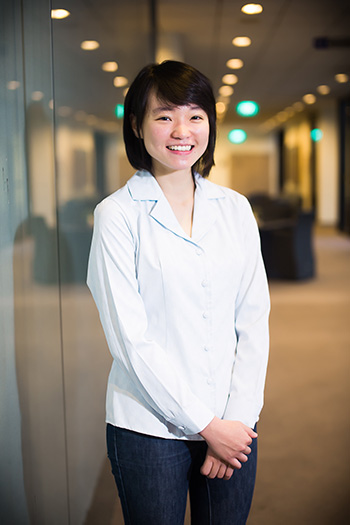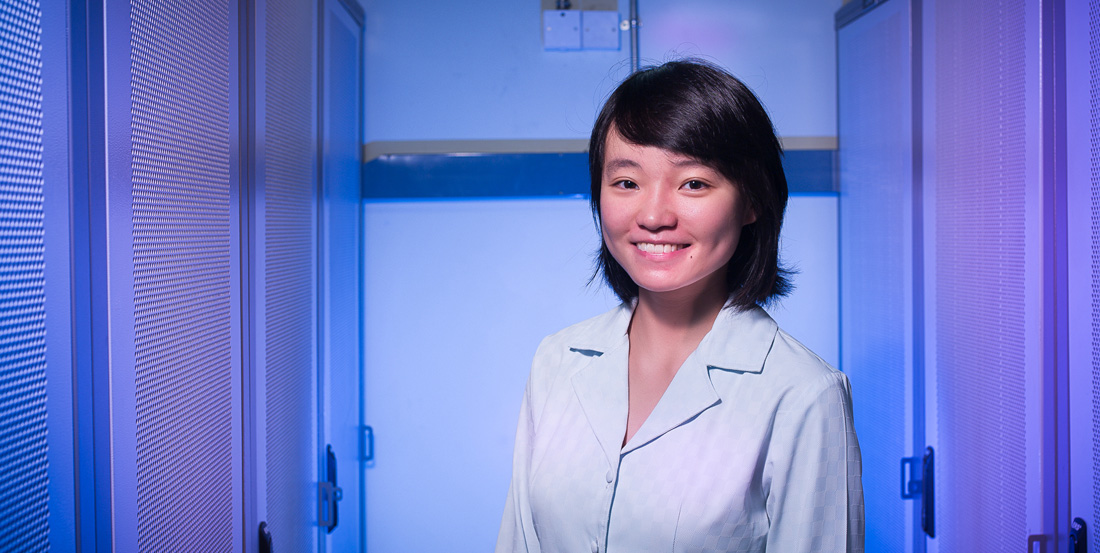T he DSTA Scholarship offers those with a passion for science and technology the unique opportunity to be at the forefront of Singapore’s defence transformation. The scholarship offers scholars the opportunity to pursue undergraduate studies at renowned universities worldwide. They can also look forward to career opportunities in various organisations within the DTC, which include the Defence Science and Technology Agency (DSTA) and DSO National Laboratories (DSO).
We talk to two DSTA scholars, Yap Hui Qing and Woon Tian Kai, who tell us how the DSTA Scholarship has opened the door for them to exploit advances in modern science and technology.
What sparked your interest in this field and the DSTA Scholarship?
Yap Hui Qing: In cybersecurity, we assess various approaches before deciding on the most elegant solution that fits a system’s operational requirements – there is no 'one-size-fits-all' solution as every project has its own set of considerations.
We put measures in place to secure a system without compromising its functionality and performance. The challenge of solving complex problems through the use of sound technical knowledge and innovation is why I find the field of cybersecurity so interesting.

Woon Tian Kai
DSTA Undergraduate Scholar
Designation: Senior Member of Technical Staff,
Sensors Division, DSO
Studied: Master of Science in Electrical Engineering, Stanford University, US
Bachelor of Science in Electrical Engineering,
Georgia Institute of Technology, US
Woon Tian Kai: My interest in medical imaging technologies ignited while I was taking a course. Through this course, I realised that there were intriguing similarities between medical imaging and radar, and this realisation pushed me to a decision to become a radar engineer.
As I have a strong interest in Research and Development (R&D), I decided to take up the DSTA Scholarship with the intention to join DSO. As a national defence R&D organisation, DSO’s work has a strong emphasis on practical applications in operational environments. This means that our R&D work must be of a positive impact to the SAF. As an engineer, this aspect greatly appealed to me.
Tell us about your job. What are some of your roles and responsibilities?
Hui Qing: As a cyber defence engineer, I provide protection and threat detection capabilities to protect critical network links and information. As the SAF continues to harness networked systems, its exposure to potential cyber threats will increase as well. Cybersecurity engineers play a key role in anticipating the different forms of attacks, understanding their potential impact and developing innovative solutions to counter them.
The work of a cybersecurity engineer is not a deskbound or isolated one. I work closely with various project teams to enhance the information security of Singapore’s defence systems. I also get the opportunity to partner different stakeholders in the DTC to plan the national cybersecurity strategy and roadmap.
Tian Kai: As a radar systems analyst, my work involves designing radar systems and analysing their performance. The latter is critical as all systems used in the battlefield must be operationally robust. Lives are at stake here and, as such, a great deal of time is spent on the evaluation and optimisation of radar performance with respect to radar operations, design, hardware and algorithms. It can be challenging to ensure that all aspects of radar design work together as intended, but devising a new application, technique or design and integrating them together is a hugely rewarding experience.
Share with us some of the more memorable episodes in your scholarship journey and career.

Yap Hui Qing
DSTA Undergraduate Scholar
Designation: Engineer (Cybersecurity), DSTA
Studied: Master of Engineering,
University of California, Berkeley, US
Bachelor of Science in Electrical Engineering,
University of Illinois at Urbana-Champaign, US
Hui Qing: During my university days, I participated in many events and programmes such as clean-up efforts in New Orleans, US, in the aftermath of Hurricane Katrina. I was also a Teacher Advisor for the Engineering Freshmen and conducted classes for the first-year students in the Engineering College.
Through my scholarship, I had the opportunity to complete my internship at the Naval Systems Programme Centre, where I learnt about the various weapons deployed in different defence platforms. It allowed me to gain familiarity with DSTA’s organisational structure and the chance to delve in an actual project.
Tian Kai: When studying at Georgia Institute of Technology, an institution with a very small Singaporean community, I was forced out of my comfort zone and exposed to new cultures. I also chose to complete a semester in France through a study-abroad programme even though I was barely able to speak French! Although it was an intimidating experience, it helped to strengthen my level of confidence and independence.
One of my most memorable episodes at work is when I was given the task of testing a radar algorithm shortly after I joined DSO. I decided that the only way to test the algorithm was to do so with a working radar system. As such, I built a prototype radar system within the first three months of joining DSO with the spare components I found in my lab!
How have you been supported in your development?
Hui Qing: I was sponsored for my Master’s degree at the University of California at Berkeley in the US. The DSTA Undergraduate Scholarship was particularly appealing to me as I was able to obtain both my Bachelor’s and Master’s degrees through one scholarship.
During my studies under the DSTA Scholarship, I was shown much support and given the opportunity to broaden my learning experience. For instance, when I was keen on completing my final semester as well as my final project work in Sweden, the DSTA Scholarship Office supported my choice and helped to facilitate my application.
Tian Kai: DSO recognises that its people are its greatest asset and provides us with many in-house training development programmes to develop our technical expertise. We also get to attend overseas conferences to keep abreast of the latest developments – I had the opportunity to travel to Baltimore in the US to attend the Defence, Security and Sensing conference.
I was also sponsored for my studies in Stanford University in the US where I completed my Master’s degree in Electrical Engineering. The experience in Stanford was fantastic for the quality and diversity of the education. While taking my core Electrical Engineering courses, I was free to take other classes to broaden my horizon, including political science, psychology, philosophy, and even tennis and photography.
What advice do you have for aspiring DSTA scholars?
Hui Qing: It is only when you are sincere and genuinely enjoying what you do that you can derive immense satisfaction out of your career and life. I have met many fascinating colleagues who pursue different interests and are even given the avenue to showcase their talents – photography, sports, singing on-stage and even balloon-sculpting!
Although it can be challenging to deal with complex and large-scale systems at DSTA, overcoming these challenges will prove rewarding and give you a great sense of achievement. Therefore, embrace the challenge and seek to push the envelope on defence engineering.
Tian Kai: Meet people, ask questions, and have a good understanding about the organisation you plan to work in after graduating. Think about how you can contribute your skills, both in the technical and non-technical areas.
In addition, do not limit yourself to the courses within your degree. Try to gain a learning experience beyond your core subjects. If you’re headed for the US, try and experience your university’s liberal arts programme and learn as much as possible from diverse sources of knowledge. This will help you build new perspectives and character, which will contribute to the quality of your technical career and life.

